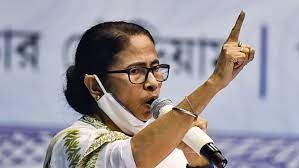Manas Dasgupta
NEW DELHI, July 22: With the cracks in the opposition ranks exposed in the just-concluded presidential elections, the senior opposition leaders shocked over the Trinamool Congress decision to abstain from voting in the vice-presidential elections scheduled for August 6 is trying to woo the West Bengal chief minister Mamata Banerjee to keep the opposition camp intact.
A senior opposition leader countering the TMC’s arguments that the party was not consulted before deciding on the Congress veteran Margaret Alva as the joint opposition candidate for the vice-presidential election, said the Congress national president Sonia Gandhi had spoken on phone to Banerjee on July 15 to discuss the Opposition’s plan to contest the vice-presidential (VP) poll.
After the NDA announced the former West Bengal governor Jagdeep Dhankhar as its VP candidate on July 16, Ms Gandhi tried to reach Ms Banerjee again but wasn’t successful, the Opposition leader claimed.
Before the opposition leaders met on July 17 to discuss the joint opposition candidate and zeroed on the former Rajasthan governor Alva, the veteran leader and the Nationalist Congress Party chief Sharad Pawar had again tried to contact Banerjee but could not. Pawar had told the reporters after the meeting that he too was unable to reach out to Ms Banerjee. He, however, had expressed the confidence that the TMC leader who had taken the initiative to unite all the non-BJP parties to contest the presidential elections against the NDS nominee, would stay with the opposition in the VP poll as well.
The TMC on Thursday announced its decision to boycott the vice-presidential elections alleging that the support of the 35 MPs of TMC was “taken for granted and wasn’t consulted before announcing Ms Alva’s candidature.” With Parliament session on, the Congress however has refused to officially comment on Trinamool’s decision not to back the Opposition candidate.
Alva herself while appealing to the TMC to vote for her said the VP election was not the time for “whataboutery, ego or anger.” “The TMC’s decision to abstain from voting in the VP election is disappointing. This isn’t the time for ‘whataboutery’, ego or anger. This is the time for courage, leadership and unity. I believe, Mamata Banerjee, who is the epitome of courage, will stand with the opposition,” Ms Alva tweeted.
The National Conference leader Omar Abdullah has compared the unity among opposition parties to Greek mythological character ‘Chimera’, which has also come to mean an impossible idea or hope and said ultimately political parties would do what was in their own interest.
“Opposition unity is a bit of a chimera. Ultimately political parties will do what’s in their own interest and that’s as it should be. Jammu and Kashmir saw this when we were left high and dry by ‘friends’ in 2019…” Abdullah tweeted.
Dhankhar’s elevation as Vice President will move him out of Bengal to Delhi, and for Ms Banerjee, that is a huge win. The Chief Minister and Dhankhar have clashed relentlessly over the past three years with Ms Banerjee accusing the governor of hounding her at the instance of the BJP at the centre. She had been constantly demanding the prime minister Narendra Modi to move Dhankhar out of West Bengal and in his elevation as the vice-president her long-time demand would be fulfilled.
The counting of votes in the presidential elections taken up on Thursday has shown that a large number of opposition MLAs cross-voted in favour of the BJP’s presidential candidate Droupadi Murmu, who won the elections securing more than 64 per cent votes. Around 125 MLAs and 17 opposition MPs cross-voted in Droupadi Murmu’s support, sources said.
Soon after Droupadi Murmu was elected winner versus the opposition’s Yashwant Sinha, the BJP’s Chief Ministers Shivraj Singh Chouhan of Madhya Pradesh and Himanta Biswa Sarma of Assam put out messages “thanking” opposition MLAs who had voted “according to their conscience.”
Droupadi Murmu even won an unexpected vote from Kerala, where the BJP-led National Democratic Alliance (NDA) has not a single MLA in the 140-member assembly. The ruling Left-led coalition and the opposition Congress-led UDF had both announced their support for Yashwant Sinha.
In Assam, 25 opposition MLAs voted for Murmu. “Droupadi Murmu polled 104 votes compared to NDA’s original strength of 79 in the 126 member Assam Assembly. 2 absent. My heartfelt gratitude to the people of Assam for reposing their faith in the NDA’s Presidential candidate and wholeheartedly joining this historic moment,” tweeted Assam Chief Minister Himanta Sarma.
Similar cross-voting had taken place during recent Rajya Sabha polls in the state, when the ruling BJP won both seats. Both the Congress and the All India United Democratic Front (AIUDF) have accused each other of cross-voting.
In Madhya Pradesh, Droupadi Murmu won 16 extra votes; she received 146 votes and Yashwant Sinha, 79. “Droupadi Murmu got more than the BJP votes. I thank the other party MLAs who listened to their conscience and voted for our candidate,” Chouhan said in a video message.
In Bengal, the BJP has 69 MLAs but Droupadi Murmu won 71 votes. Yashwant Sinha did not win all opposition votes even in his home state Jharkhand, where only nine of 81 MLAs supported him.
In Maharashtra, Chief Minister Eknath Shinde had won 164 votes during his trust vote – that is the number of NDA votes – but 181 MLAs voted for Droupadi Murmu.
A few MLAs of Mamata Banerjee’s Trinamool Congress cross-voted in Meghalaya while in Manipur, Congress MLAs backed the NDA candidate. Six opposition MLAs each from Bihar and Chhattisgarh, four from Goa and 10 from Gujarat may also have voted for Droupadi Murmu.
Yashwant Sinha did not get a single vote in Andhra Pradesh, Sikkim and Nagaland. Droupadi Murmu won 2,824 first preference vote compared to Yashwant Sinha’s 1,877, not a huge margin but in respect of the value of votes what Murmu got was valued at 6,76,803 compared to Yashwant Sinha’s 3,80,177 votes.

